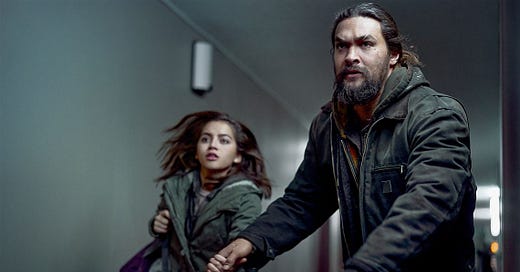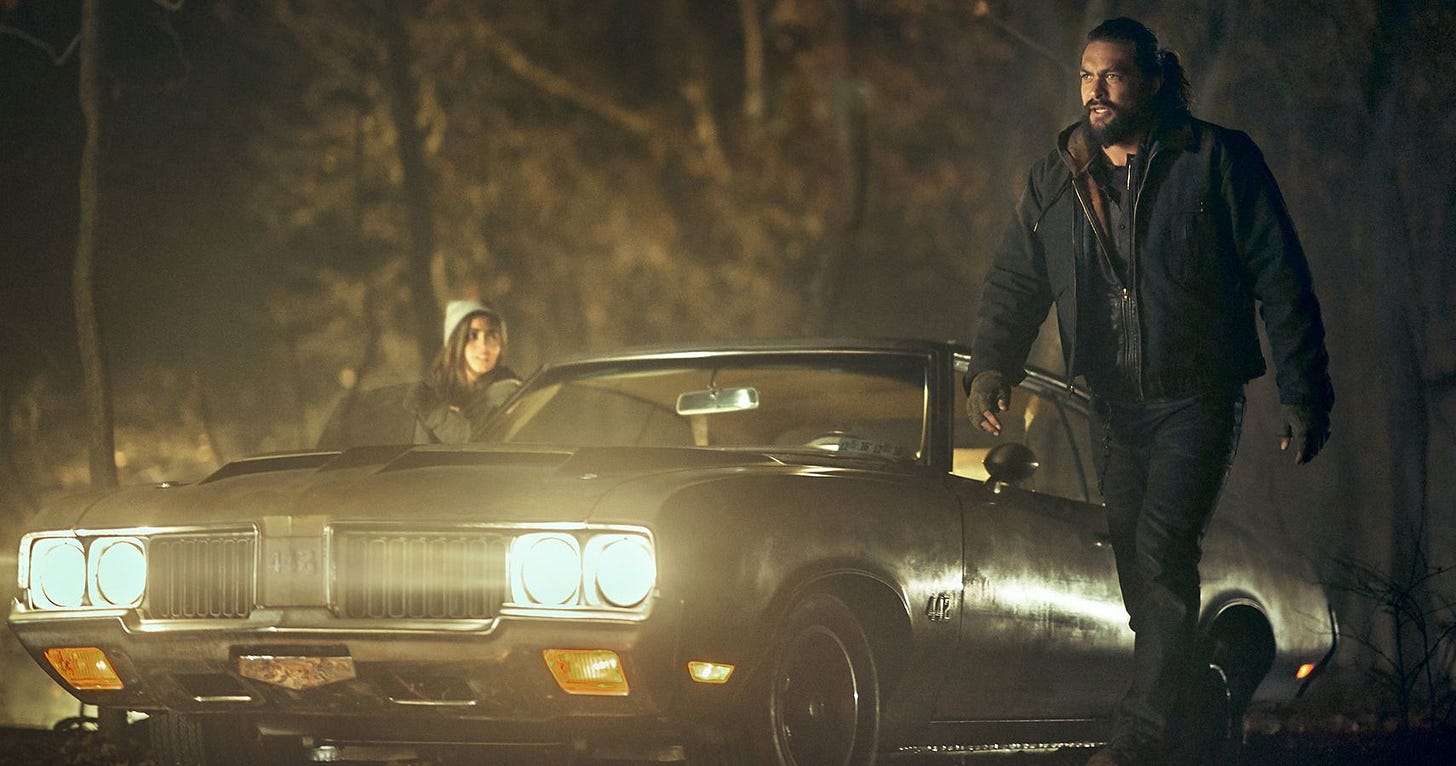I used to joke to people who were loving comic book movies that they’d wake up drunk one day, and an “Aquaman” movie would be sitting in bed next to them. And then it turned out everyone wanted that, to the tune of a cool billion dollars at the box office. This seems like an anomaly in an era where the monoculture was dying. When I took my mother to a movie in 2023, there was a trailer for “Aquaman And The Lost Kingdom”, and she turned to me and asked, “They’re making Aquaman movies now?”
Still, Jason Momoa was, is, a star. When he was featured in “Batman V. Superman” for a wordless cameo back in 2013, he was being cast in badass lead roles even before that muted cameo finally surfaced in 2016. He played a lot of tough guys because, essentially, that’s his brand – big, beefy and bearded. But the more we got to see Momoa, the more we realized he had a sensitive side, a sweet side. He seemed like the life of the party, but also the guy who hung out during the afterparty, making sure everyone got home safe.
Thus, seeing Momoa play a father to a teenage girl so early in his career somehow feels right. In “Sweet Girl”, he gets to play a Netflix Daddy to Isabel Merced, the two of them trapped inside a movie that’s an algorithmic exercise. There’s a vaguely futuristic slant to “Sweet Girl”, where the head of a pharmaceutical agency (Justin Bartha) has made a veritable miracle drug, basically a cancer cure, unavailable to the general public. Glamorous and gorgeous Adria Arjona, as Ray’s wife Amanda, is glamorously and gorgeously dying, and Momoa’s Ray Cooper (good action name) is plenty pissed that the way to save her is sitting there somewhere in a lab, untouched. Of course this corporate stooge would be that doofus Doug from “The Hangover” – there’s a great scene where he’s live on a news program and takes a call from an irate Momoa who proceeds to threaten him. You can see Bartha’s manhood shrivel up in mere seconds, which is either good acting, or Momoa absolutely meant it.
Amanda passes on, and now Ray and his daughter Rachel have to cope with the aftermath. It’s a visit from a journalist that changes the calculus. Hoping to silence what this pencil-pusher knows, a goon attacks Ray and the writer, resulting in a close-quarters brawl. And now the action movie begins. Sorta. Maybe. Turns out, that battle took a lot out of Ray, so we get a plausible two year pause. Getting injured in a fight with a corporate assassin would realistically put you on the shelf for a while.
Of course, now the truth is near, and this company is covering up their illegal machinations. They didn’t just kill Ray’s wife, they’re malicious about not helping others. You know, like a pharmaceutical company in real life. Ray now decides to cut a swath through a number of goons protecting the ivory tower. People are thrown out windows, there are booby traps, car chases, everything you’d expect. There’s a visceral element to the violence in that train sequence, and the rest of the film never approaches this. Each fight is over-photographed and under-choreographed, just a few flashes of fists and shoulders. The downbeat monotony of the storyline doesn’t help keep your eyes open.
Maybe you knew this, maybe you didn’t, I’m not gonna make a big spoilery deal about it. But this movie’s got a twist, and it’s… well, it’s probably one you’ve seen before, and I can’t think of a single instance where it passes the smell test. Knowing Netflix, they will occasionally franchise some movies. I doubt there’s a “Sweet Girl 2” coming down the pike, but if there is, the whole thing will have been spoiled, so plan accordingly. I’m being facetious, of course, because this particular twist is so lousy I can’t imagine anyone pushing for a new installment. It doesn’t work thematically, it doesn’t reveal another layer to the story or the themes. It just reminds you that sometimes, pettily, movies can cheat.
Like most action movies, “Sweet Girl” is hypocritical in the idea of preserving a life (and eventually, a memory) by causing more death. It’s not a productive way of thinking about justice, and yet people love action movies for this fallacy. People love death, but they’re too scared to participate. They’d rather death be motivated by a “moral” or a “cause”. And in the end, they will not have the guts to embrace this ideology, but will gladly support state-sponsored murder.
Prison in America is merely an off-shoot of that. We owe it to the future, we owe it to later generations, to start to work towards weaning ourselves off mass incarceration. We do that by emphasizing that prison is not a destination, but in fact a waystation. Some people will have forty and fifty year sentences, but the bulk of inmates will only be imprisoned for a few years, some for even several months. There will be an “after”. Sending someone to prison, by nature, isn’t automatically a death sentence, so we need to stop treating it as such. There should be an infrastructure in place to allow all these men and women to be an asset to our society. Friends and family help, but a responsible government would lead the way, with programming, housing opportunities, and incentives to help better our communities. The “after” is real.








I just looked up the ending, and I feel like someone had either seen Fight Club too many times or was just very sleep deprived.
I think your criticism here is something that applies to so many revenge movies. The idea that going on a murderous rampage will repair the damage is a deeply unhealthy one to take seriously. When Charles Bronson shoves a bad guy into a vat of acid in Death Wish 5, you cheer because it's the good guy doing it. When the bad guy shoots somebody, it's bad because he's bad and not our guy. It's often a very myopic viewpoint masquerading as gritty.